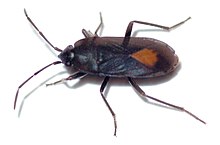
Christoph Gottfried Andreas Giebel was a German zoologist and palaeontologist. He was a professor of zoology at the University of Halle where he managed the zoology collections at the museum. His interests were in systematics and paleontology and he opposed Darwinian evolution. He published several works including Palaozoologie (1846); Fauna der Vorwelt (1847-1856); Deutschlands Petrefacten (1852); Odontographie (1855); Lehrbuch der Zoologie (1857); and Thesaurus ornithologiae (1872-1877).

Buprestis is a genus of beetles in the tribe Buprestini, the jewel beetles. As of 2011 there were 78 described species distributed across most of the world's biogeographic realms except parts of Africa and Antarctica.

Lamiinae, commonly called flat-faced longhorns, are a subfamily of the longhorn beetle family (Cerambycidae). The subfamily includes over 750 genera, rivaled in diversity within the family only by the subfamily Cerambycinae.

Harpalus is a genus of ground beetle first described by Pierre André Latreille in 1802.
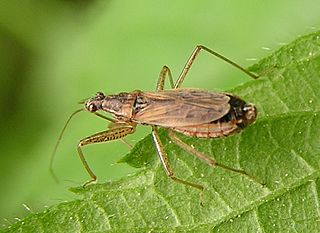
Nabis is a genus of damsel bugs in the family Nabidae.

Platymeris is a genus of assassin bug (Reduviidae). Platymeris species are often used in laboratories and as pets.

Badister is a genus of ground beetle in the family Carabidae native to North Africa, the Near East, and the Holarctic, including Europe.

Buprestites is a fossil genus of beetles in the family Buprestidae, containing the following species:
Zygadenia is an extinct genus of archostematan beetles from the Jurassic to Cretaceous. It is considered to be a senior synonym of Notocupes by Kirejtshuk (2020), but other researchers suggest to reserve the genus Zygadenia as a form taxon for isolated elytra that probably belong to the genus Notocupes, while retaining Notocupes as a valid genus for complete body fossils.

Cicada is a genus of old world cicadas in the family Cicadidae, and the tribe Cicadini. There are at least 60 described species in Cicada.
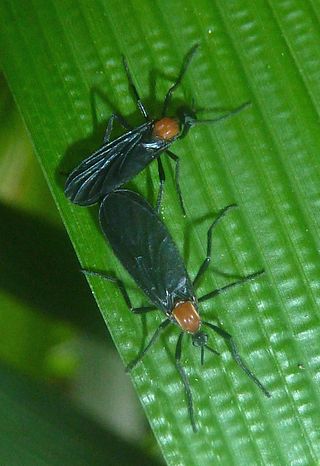
Plecia is a genus of March flies (Bibionidae) comprising many species, both extant and fossilised.
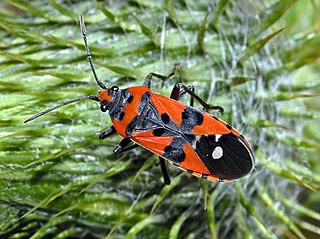
Lygaeus is a genus of seed bugs in the family Lygaeidae. There are more than 60 described species in Lygaeus.
The Pseudotettigoniinae are an extinct subfamily of the Tettigoniidae.

Alydus is the type genus of broad-headed bugs in the family Alydidae. There are about 11 described species in Alydus, including 2 extinct species. Species are recorded from North America and Europe through to temperate Asia.
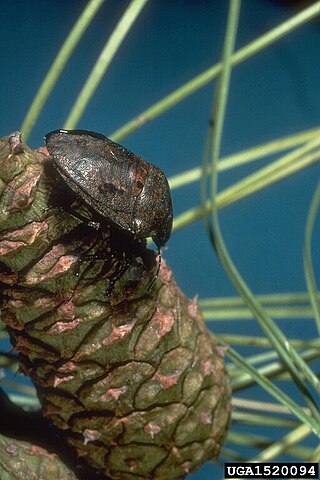
Tetyra is a genus of shield-backed bugs in the family Scutelleridae. There are about seven described species in Tetyra.

Amphotis is a genus of sap-feeding beetles in the family Nitidulidae. There are about eight described species in Amphotis.

Ampedus is a genus of click beetles in the family Elateridae. There are currently 461 recognized species of Ampedus beetles. It has a cosmopolitan distribution, but is found mostly in the Holarctic region, primarily in North America, Europe, and Asia. The oldest known fossil from this genus was found in Eocene Baltic amber, estimated to be from 38.0 to 33.9 million years ago.

Selatosomus is a genus of beetles belonging to the family Elateridae. The species of this genus are found in Europe, Japan, southern Africa and North America, and most of the species were formerly included in the genus Ctenicera.
Protepiptera is a genus of fossil planthoppers belonging to the family Achilidae.
